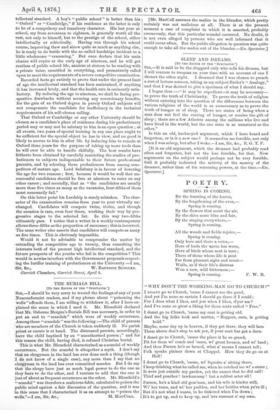THE BURIALS BILL.
[TO THE EDnva OF THE " SPECTATOR:] Sun,—I should be very sorry to wound the feelings of any of your Nonconformist readers, and if my phrase about "poisoning the -wells " offends them, I am willing to withdraw it, after I have ex- plained the sense in which I used it. Mr. Blomfield declared that Mr. Osborne Morgan's Burials Bill was necessary, in order to .put an end to "scandals" which were of weekly occurrence. Among these " scandals " was the following :—The child of parents who are members of the Church is taken suddenly ill. No parish priest or curate is at hand. The distressed parents, accordingly, -have the child baptised by an "unauthorised person ;" and for this reason the child, having died, is refused Christian burial.
This is what Mr. Blomfield characterised as a scandal of weekly occurrence. But the scandal is altogether a myth. I don't say that no clergyman in the land has ever done such a thing (though I do not know of a single case), any more than I say that no clergyman in the land has ever committed murder. But I do say that the clergy have just as much legal power to do the one as they have to do the other, and I venture to add that the one is just of about as frequent occurrence as the other. Mr. Blomfield's " scandal" was therefore a malicious fable, calculated to poison the -public mind against a fair discussion of the question, and it was in this sense that I characterised it as an attempt to "poison the [Mr. MacColl assumes the malice in the blunder, which pretty certainly was not malicious at all. There is at the present moment a case of complaint in which it is asserted, probably erroneously, that this particular scandal occurred. No doubt, it is not even alleged by persons who are well informed that it could occur often. But the public allegation in question was quite enough to take all the malice out of the blunder.—En. Spectator.]


































 Previous page
Previous page